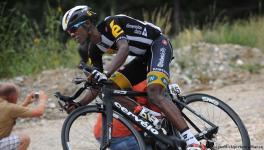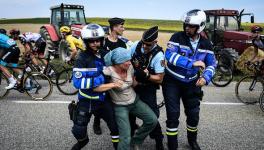The Tour de France Femmes: Finally Here to Stay?
The Tour de Femmes could well feature a duel between Elisa Longo Borghini and Annemiek Van Vleuten
Marion Rousse remembers the summer days of her childhood. It was hot, she was on vacation and had only one thing on her mind: the Tour de France.
"I didn't miss a single stage on TV, and when the Tour came past, I would stand on the side of the road and cheer on the riders," the 30-year-old tells DW.
Back then, Le Tour was an all-male affair. Now Rousse is playing a key role in efforts to change that.
"We want female role models. With the new Tour de France Femmes [women], it will become more normal to see women on road bikes and racing. During my time, unfortunately, it wasn't."
Training professionally without getting paid
Her time was from 2010 to 2015, when she was a "professional" cyclist.
Marion Rousse has done it all, from active cyclist, to TV pundit, to race director
"There was no salary, so I had to find a job," she recalls, clarifying the term. "That meant working two jobs. I worked in the city administration in the morning and trained in the afternoons," she says of her time in the saddle, which she crowned by winning the French National Road Race in 2012.
Three years later she retired from cycling "because I had to earn money." Rousse then went on to just about every job there is in the cycling world: TV commentator, race director and even hostess on the podium, a role that has been widely panned as symbol of inequality in cycling.
"A lot has changed since then," Rousse said in an interview with TOUR cycling magazine back in April. Now, she says, people are recognizing the enormous growth potential of female cycling.
The industry is seeing increased sales of bikes, clothing and accessories for women. Women's cycling is also attracting more sponsors, and races such as the female edition of the Paris-Roubaix have become crowd-pleasers.
Marion Rousse even worked as a podium hostess for a time
The riders are now starting to reap the benefits: In the top tier of women's cycling, there is now a minimum wage of €27,500 ($28,000). Since this was introduced, the salaries of female riders have doubled or even tripled, reports British rider Elizabeth Banks of the EF Education Team. Cycling's world governing body, the UCI, cites an increase of at least 25%.
"We're not there yet with women's cycling, but we're getting there," Rousse said.
1,029 kilometers from Paris to the Vosges
Featuring 144 riders on 24 teams, the Tour de France Femmes marks the culmination of this development.
The race begins where the men's race ends: on the Champs-Elysees in Paris. Shortly before the men sprint for victory in the last stage on Sunday, the women start their Tour – made up of eight stages from Paris via the Champagne region to the Vosges mountains. The course covers 1,029 kilometers (639 miles) and offers opportunities for sprinters, classics specialists and climbers.
The favorite this year is 39-year-old mountain specialist and Giro d'Italia winner Annemiek van Vleuten (Team Movistar) of the Netherlands. However, she has several strong challengers in the form of Italians Elisa Longo Borghini (Trek-Segafredo) and Marta Cavalli (FDJ-SUEZ-Futuroscope) as well as Poland's Katarzyna Niewiadoma (Canyon-Sram), South African Ashleigh Moolman and Dutch compatriot Demi Vollering (both SD Worx).
Male and female riders were honored on the same podium at the 1986 Tour
A fraction of the men's prize money
The winner will receive €50,000 in prize money – a tenth of what the men's winner gets. The Tour de France is still a long way from achieving equal pay, as has been introduced by the Tour of Flanders.
Rousse, however, rejects criticism of this imbalance: "The important question for our sport is: How can we make sure that salaries go up? This is where we want to get involved."
A history of false dawns
Rousse is the mother of a one-year-old son and the wife of world cycling champion Julian Alaphilippe. Cycling keeps the young family on the road most of the year. "We're used to it," Rousse smiles.
Her goals for the Tour de France Femmes are as ambitious as they are long-term: she wants to establish the race as an independent event and "not just become an appendage of the men's Tour."
Two hours of live coverage per stage will be broadcast worldwide, and that television coverage is bound to be critical to the success of the Tour, which follows a number of failed forerunners.
The Tour de France Femmes will have the same starting point as the men
The first attempt was a one-off one-day race in 1955. The first real Tour de France for women was held in 1984, 81 years after the first men's race. At that time, it was still called Tour de France Féminin, but was later renamed the Grande Boucle Féminine Internationale and then Route de France Féminine. The number of stages varied greatly, from 18 daily stages at the beginning to only four in 2009, the last edition of the race.
In recent years, women's cycling has experienced an upswing, and Tour organizers ASO initially responded with a one-day race (La Course), which is now being followed by the Tour de France Femmes. This came after around 97,000 people signed a petition titled Le Tour Entier ("the whole tour") to demand a women's race.
"After a century, it is finally time to allow women to ride their Tour de France as well," the petition read.
Still around in 100 years?
Even though it lacks a time trial and doesn't go up the highest mountains, the Tour de France Femmes marks the highlight of the women's cycling season. And Marion Rousse stresses that her aim is for the race to emancipate itself from the men's event.
"There will be a promotional caravan, there will be the same security measures as for the men, it will be a big event. The women's Tour de France will be worthy of its name," she insists.
After previous efforts at a women's Tour failed, Rousse is also determined that this time, it is here to stay.
"We hope the Tour de France Femmes will still be around in 100 years," she says. "I will fight and I am very confident."
This article was translated from German by Chuck Penfold and edited by Matt Ford.
Get the latest reports & analysis with people's perspective on Protests, movements & deep analytical videos, discussions of the current affairs in your Telegram app. Subscribe to NewsClick's Telegram channel & get Real-Time updates on stories, as they get published on our website.






















